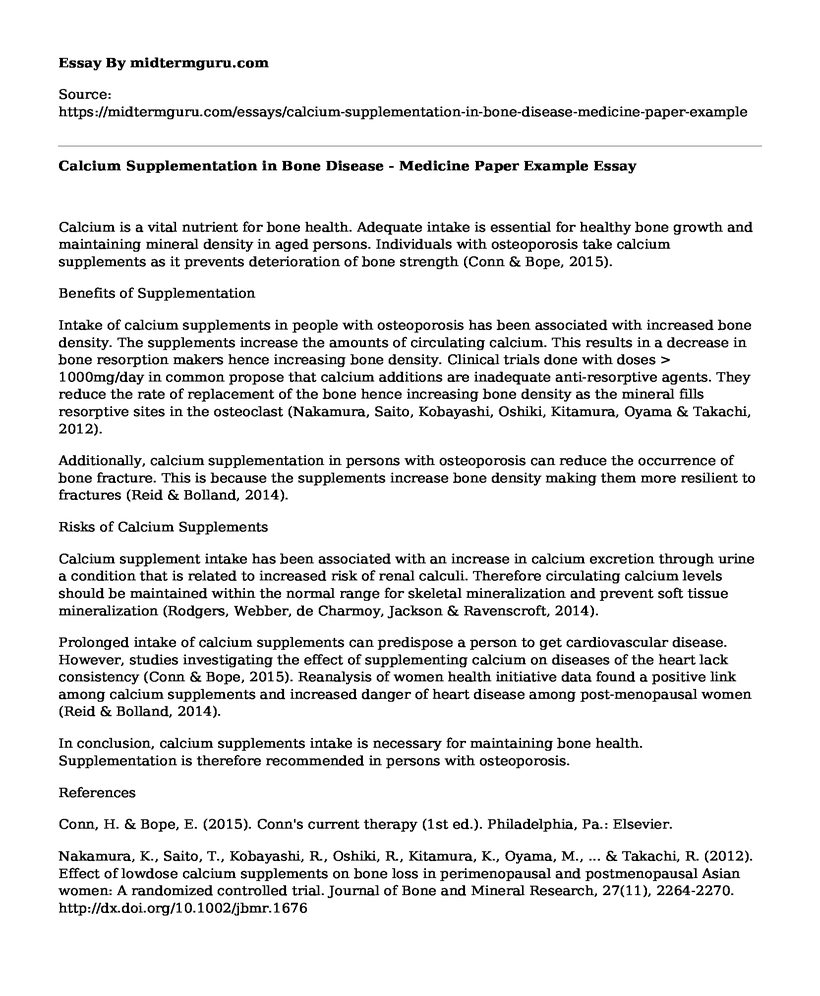Calcium is a vital nutrient for bone health. Adequate intake is essential for healthy bone growth and maintaining mineral density in aged persons. Individuals with osteoporosis take calcium supplements as it prevents deterioration of bone strength (Conn & Bope, 2015).
Benefits of Supplementation
Intake of calcium supplements in people with osteoporosis has been associated with increased bone density. The supplements increase the amounts of circulating calcium. This results in a decrease in bone resorption makers hence increasing bone density. Clinical trials done with doses > 1000mg/day in common propose that calcium additions are inadequate anti-resorptive agents. They reduce the rate of replacement of the bone hence increasing bone density as the mineral fills resorptive sites in the osteoclast (Nakamura, Saito, Kobayashi, Oshiki, Kitamura, Oyama & Takachi, 2012).
Additionally, calcium supplementation in persons with osteoporosis can reduce the occurrence of bone fracture. This is because the supplements increase bone density making them more resilient to fractures (Reid & Bolland, 2014).
Risks of Calcium Supplements
Calcium supplement intake has been associated with an increase in calcium excretion through urine a condition that is related to increased risk of renal calculi. Therefore circulating calcium levels should be maintained within the normal range for skeletal mineralization and prevent soft tissue mineralization (Rodgers, Webber, de Charmoy, Jackson & Ravenscroft, 2014).
Prolonged intake of calcium supplements can predispose a person to get cardiovascular disease. However, studies investigating the effect of supplementing calcium on diseases of the heart lack consistency (Conn & Bope, 2015). Reanalysis of women health initiative data found a positive link among calcium supplements and increased danger of heart disease among post-menopausal women (Reid & Bolland, 2014).
In conclusion, calcium supplements intake is necessary for maintaining bone health. Supplementation is therefore recommended in persons with osteoporosis.
References
Conn, H. & Bope, E. (2015). Conn's current therapy (1st ed.). Philadelphia, Pa.: Elsevier.
Nakamura, K., Saito, T., Kobayashi, R., Oshiki, R., Kitamura, K., Oyama, M., ... & Takachi, R. (2012). Effect of lowdose calcium supplements on bone loss in perimenopausal and postmenopausal Asian women: A randomized controlled trial. Journal of Bone and Mineral Research, 27(11), 2264-2270. http://dx.doi.org/10.1002/jbmr.1676
Reid, I. & Bolland, M. (2014). Calcium riskbenefit updatedNew WHI analyses. Maturitas, 77(1), 1-3. http://dx.doi.org/10.1016/j.maturitas.2013.10.003
Rodgers, A. L., Webber, D., de Charmoy, R., Jackson, G. E., & Ravenscroft, N. (2014). Malic acid supplementation increases urinary citrate excretion and urinary pH: implications for the potential treatment of calcium oxalate stone disease. Journal of Endourology, 28(2), 229-236. http://dx.doi.org/10.1089/end.2013.0477
Cite this page
Calcium Supplementation in Bone Disease - Medicine Paper Example. (2021, Jun 02). Retrieved from https://midtermguru.com/essays/calcium-supplementation-in-bone-disease-medicine-paper-example
If you are the original author of this essay and no longer wish to have it published on the midtermguru.com website, please click below to request its removal:
- Annotated Bibliography About Children With Autism
- Essay on Stress Biomarkers: Salivary Cortisol
- Art Essay Sample: Migrant Mother - Photograph by Dorothea Lange
- Repudiation of Drug Samples - Essay Sample
- Essay Sample on Breast Cancer and Prostate Cancer Disorders
- The Association Between Weight Gain and Sleep Deprivation - Research Paper
- Anxiety in Autism: Mediating Role in Academic Behaviour & Skills Development - Research Paper







